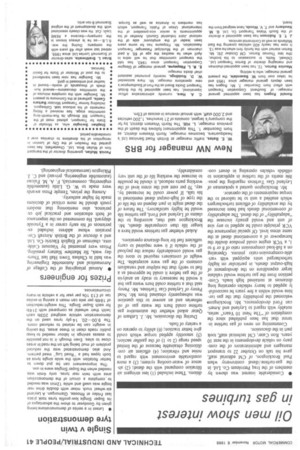Oil men show interest in gas turbines
Page 43

If you've noticed an error in this article please click here to report it so we can fix it.
• Considerable interest was shown by members of the Iraq Petroleum Co. Ltd. in the gas-turbine /diesel controversy when Paul Brockington, of CM editorial staff, gave his talk on October 22 to transport managers and administrators of the company on vehicle developments in the next 10 years. Ron Cater, CM technical staff, took part in the discussion.
Commenting on news of gas turbine interest that has been published since the completion of "The Next 10 Years" series, notably with regard to Leyland and American Ford developments, Mr. Brockington. welcomed the probability that the gas turbine would within a few years be successfully applied to heavy vehicles operating long distances at sustained high loads. Competition from the gas turbine would validate larger expenditure on the development of high-output diesels, in particular on highly turbocharged units equipped with variable-compression-ratio pistons. Operating on a full-load compression ratio of 8 or 9 to 1, a VCR engine could produce double the horsepower of a conventional diesel at the same stress level. Of special importance the VCR principle could be applied to any size of unit and would greatly increase the "adaptability" of the diesel. The adaptability of conventional diesels had been increased by the availability of efficient turbochargers which enabled a unit to be tailored to the torque requirements of the operator.
Mr. Brockington quoted a spokesman of Leyland Gas Turbines regarding the possible merits of the turbine in application to oilfields vehicles operating in desert con ditions. These included (1) less stringent air filtration compared with the diesel; (2) absence of water-cooling system; (3) a more comfortable environment with regard to noise and vibration; (4) efficient air conditioning obtainable because of the limited speed range (2 to 1) of the gasifier section; (5) smoothly applied torque which could give better traction; (6) ability to operate on a variety of fuels.
During the discussion, Mr. J. Letham of Qatar asked whether the automotive gas turbine could burn the waste gas of oil refineries and an answer to this question wasP subsequently obtained from Mr. Noel Penny of Leyland Gas Turbines. Mr. Penny said that a turbine could burn waste gas but it would be necessary to study an analysis of the gas before it could be approved as a fuel to verify that the sulphur and vanadium contents of the gas were acceptable. The weight of containers required to store the gas would considerably reduce the payload of the vehicle if it were required to carry sufficient fuel for long-distance operations.
Asked whether gas turbines would have a longer life than comparable diesels, Mr. Brockington said that, according to the claims of Leyland and Ford, gas turbine life would be highly satisfactory. The future of the diesel might in part depend on the life of the type of high-output diesel mentioned in his talk. If power could be increased by, say, 70 per cent and the stress level of the working parts reduced, it should be possible to increase the working life of the unit very considerably.




























































































































































